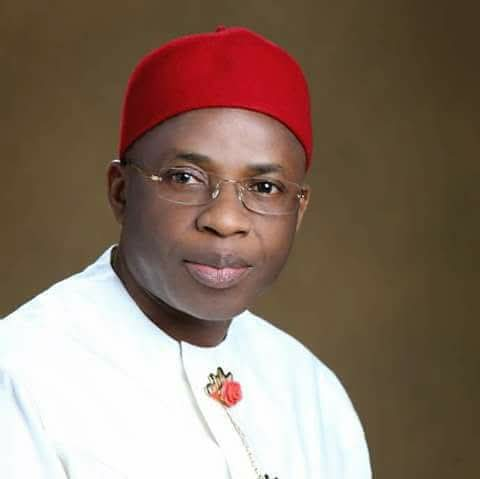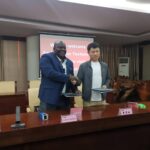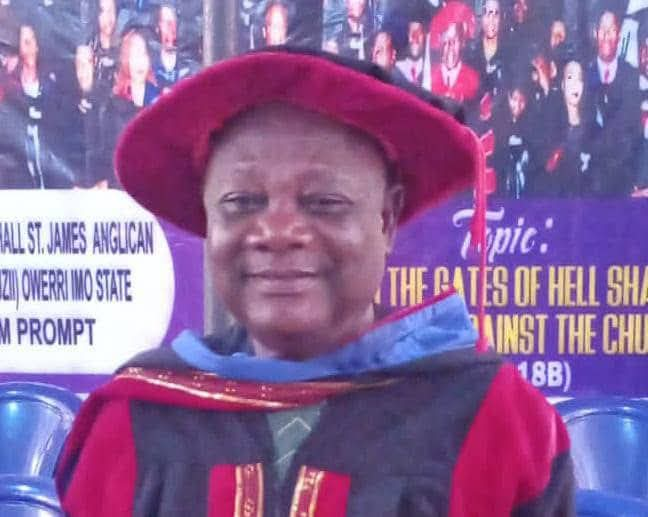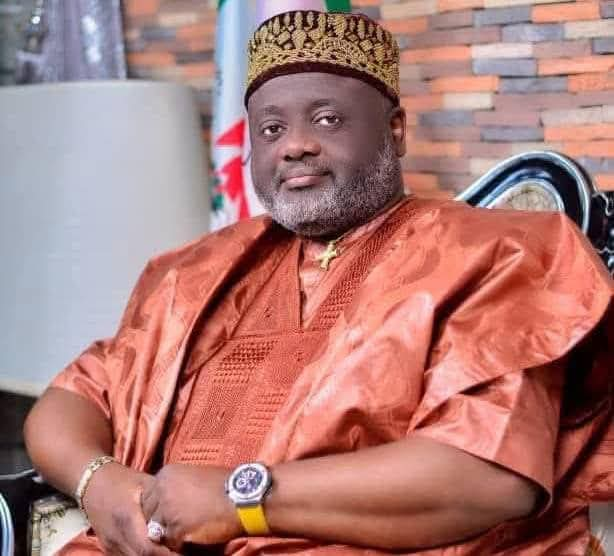■Says Uzodinma has laid foundation for prosperous Imo
Former Governor of Imo State, Dr Ikedi Ohakim, has urged Nigerians to have faith in the economic policies of President Bola Tinubu, assuring that the policies are topnotch and interventionist in nature, which have enabled the economic stability of country. He said that, but for Tinubu’s well-thought out economic policies, Nigeria would have nose-dived in all sectors by now.
Ohakim also lauded the infrastructural and development programmes of the governor of Imo State, Senator Hope Uzodinma, describing them as populist and in sinc with both his electoral promises and, the expectations of Imo people from him. He posited that Governor Uzodinma has brought both tangible and intangible development programmes to the state and expressed his satisfaction with the governor’s development initiatives.
Ohakim spoke as a Keynote Lecturer at the 2025 Synod of the Diocese of Orlu (Anglican Communion) held at St. Mary’s Anglican Church, Amandugba in Isu local government area of Imo State, over the weekend. The well attended synod,which was presided over by His Lordship,Rt Reverend Benjamin Okeke,Anglican Bishop of Orlu Diocese, had several Archbishops,bishops, the clergy,friends and associates of the church captains of industry,the academia and people from all walks of life in attendance. Ohakim spoke on the synod theme “Economic Quagmire,” which he crystalized into a broader topic, “Rebuilding Nigeria’s Troubled Economy: Practical Insight Into The Challenges And Solutions.”
According to Ohakim, the interventionist measures so far put in place by the Tinubu administration have bailed Nigeria from a looming economic quagmire. He opined that rather than misunderstand or blame Tinubu, Nigerians should hold the nation’s faulty political structure responsible for the nation’s economic setbacks. He contended that “while we wait for the ultimate political restructuring, something has to be done if the problems of our national economy, which, as we have seen, are a direct outcome of a faulty political structure,is not to overwhelm us.” He explained that the Tinubu administration has taken measures that, though painful momentarily, clearly prevented the complete deterioration of the national economy to an irretrievable point.”
The former governor of Imo State asserted that “agreed, Nigerians are reeling under temporary pains as result of some of the measures, there can be no doubt that there is a brighter future ahead.” In his words, “let me give you some examples. At the initial stage of the removal of subsidy on premium motor spirit (PMS), otherwise known as petrol, the product was sold at over N1,500 per litre. Today, it sells at about N900 per litre all over the country, and the infamous black market has been eliminated. The removal of subsidy has freed money that was hitherto starched away by a few unpatriotic persons during the subsidy regime into the hands of government.”
Ohakim averred that the resultant positive effects of such well articulated policy by President Tinubu is that “today, sub-national governments ,that is, State and Local Governments, receive more money from the Federation Account. And,many governors are putting this into good use ,thus the issue of inability to pay minimum wage,pensions and gratuities of workers are now a thing of the past in most States. There are also massive infrastructural developments across the States in Nigeria ditto as in other spheres of governance and administration. For example, Mr President recently introduced the Nigerian Educational Loan Fund (NELFUND),that will make it possible for our youths to have a better access to tertiary education. Should we not, therefore, commend the Tinubu administration for this bold intangible educational programme which will sooner or later impact positively on the economy of the country?”
Ohakim buttressed his strong support for Tinubu’s economic policies by citing the most recent publication of the Financial Times of London of May 29,2025. He averred that the Financial Times of London, in the edition under reference, noted that “…yet Tibunu, a former governor of Lagos State and the country’s wiliest in a generation, has stabilized the economy and laid the ground network for a broader recovery. This year,the World Bank expects growth of 3.7 percent in what would be Nigeria’s best performance since 2014 save for a post-Covid rebound. Most ordinary Nigerians won’t feel it yet. But, it is a decent performance when oil prices are weak. The tiny green shoots have come because Tinubu’s government has tacked the debilitating structural distortions…”
According to him, “at least we have a testament with our State under Governor Hope Uzodinma. The road revolution going on needs not to overemphasized because it is there for all to see. Before now, it took more than one hour to move from Orlu,where we are now, to Owerri. Today, it is less than 30 minutes. The same for between Okigwe and Owerri, and from Owerri to the border between Imo and Abia. I am not Governor Uzodinma’s spokesperson, but it is important to reveal what many of us do not know.”
The iniator of the Clean and Green programme which won national honours and recognition, further pointed out that “beyond roads, the Uzodinma administration is undertaking an electricity project, through the Orashi Electricity joint venture, that is expected to guarantee a twenty-four hour electricity supply in all the twenty-seven local government areas of the State before August, 2027. When that happens, your guess is as good as mine as to what the benefits will be. The economy of Imo State will experience a quantum turn around. Our youths, for example, will have the enabling environment to go into self-employment and also create jobs for others. Agriculture will receive a boost because regular electricity supply will make it possible for small scale agro-industry enterprises to spring up with the attendant positive effects on job creation. We should also applaud Governor Uzodinma’s unique initiative in rolling out a health insurance scheme that will enroll not less than 2,700 Imolites in the first year.This is unprecedented.”
He clarified that all these are offshoots of the Tinubu administration’s economic reforms which Governor Uzodinma, as a pragmatic administrator,has aptly replicated in Imo, adding that there so many other intangible and people-oriented policies that the government has put on ground for a sustainable socioeconomic, infrastructural and political development of Imo State. “I am sure that this cheering development is not only happening Imo.I am in a position to know that similar efforts and progress are being made in several other States across the country, from just one step taken by the Bola Ahmed Tinubu administration,” Ohakim stated.
While commending President Tinubu and Governor Uzodinma for their boldness in iniating positive economic policies, Ohakim opined that “one major way of escaping the economic quagmire is to have a government that has the political will to shun populism, a governor or president that will be less interested in receiving accolades from a hapless populace at the moment,or who is over conscious of how opposition elements might view his genuine policies, while the future of the same people and their children are being toyed with. The solution will lie in having a government that will not play politics with the future of the youths.”
Reflecting on his first tenure as Governor of Imo State, Ohakim stressed that as Governor,he,amongst many other long term socioeconomic policies, offered employment to 10,000 Imo graduates in the State’s public Service,established the Imo Rural Roads Maintenance Agency (IROMA) with a N12 billion worth of assets and a capacity to employ 30,000 Imo youths and also ensure infrastructural rehabilitation and maintenance of roads in all local government areas in Imo State. He said that he put in place all these long-term laudable policies and more, because he was aware that a society that fails or neglects to plan for its youths is doomed.
“But as soon as I left office, my successor collapsed all these genuine policies I had put in place for the betterment of Imo State. All the IROMA equipment worth over N12 billion then vanished into thin air,the 10,000 youths who had already put in several months in the State Public Service were all sacked without empathy.Many were bread-winners for their families and their progress in life was,therefore, cut-short. To worsen matters, the leader the leader of the 10,000 Jobs Association legitimately fighting for their reinstatement following a favourable judgment they obtained from the National Industrial Court, Dr Ugonna Emerole,a native of Okatta in Oru East local government area of Imo State was brutally killed in broad day light,and nobody asked questions. This prompted me to write a well-worded open letter to my successor in office entitled “”CURRENT TRENDS IN OUR STATE, IMO.” Till this moment, over seventy percent of those sacked youths are yet to be gainfully employed. Simply put,this is one good example of playing politics with the future of the youths,” Ohakim highlighted.
On the way forward against the backdrop of problems confronting Nigeria’s economic growth and development, Ohakim advocated for political restructuring,population control, deliberate rebuilding of rural economy,return to massive crude palm oil production, proper harnessing of proceeds from palm kernel oil as well as from palm kernel shells,fibres and cakes. He explained that “if properly articulated, 10,000 new hectares of palm value chain in each of the five South Eastern States under this unique architecture, will add over N255 billion to the economy of the South Eastern States, create over 50,000 direct jobs, build up our rural economies,rev-up the Internally Generated Revenue (IGR)for the governments and mitigate rural-urban migration.” He further pointed out that “the same model can be replicated in rice, cassava maize etc production value chain. All that is needed from the government is the enabling policy and security support to mobilize our people to take their economic destinies in their own hands. Put in a plainer language, the only way to go is to recreate our rural economy.”







